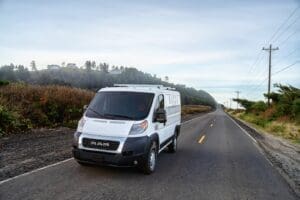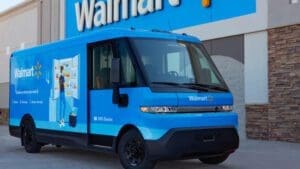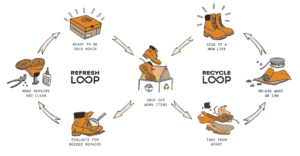 Robots are everywhere these days, from warehouses to stores to even restaurants. And while there are some concerns about whether robots will take the place of their human counterparts in a number of industries, the owners of a restaurant employing four robot servers said it is a resounding “no.” Amy, Ella, Will, and Josh are robot servers at Robotazia, a restaurant in Milton Keynes, UK. While the robots are helpful, owners Joy Gittens and Mark Swannell said the drawbacks of the robots make it clear that they will not replace humans any time soon. For one, the robots will turn around and roll away from customers that are wearing a lot of metal jewelry. Apparently, this has something to do with signals being reflected off the metal. One of the robots also has an interactive function that allows it to respond to customers’ questions. Unfortunately, this has made robot Amy “too chatty” with the customers, and the owners had to switch off the capability. The robots also quit easily; when their charge is low, they go to their recharge station even if they are in the middle of a task. So while the robots are beneficial to some degree, they still are not human, and therefore cannot be counted on to perform the job fully up to standards. This means that human jobs are safe, at least for now. And now on to this week’s logistics news.
Robots are everywhere these days, from warehouses to stores to even restaurants. And while there are some concerns about whether robots will take the place of their human counterparts in a number of industries, the owners of a restaurant employing four robot servers said it is a resounding “no.” Amy, Ella, Will, and Josh are robot servers at Robotazia, a restaurant in Milton Keynes, UK. While the robots are helpful, owners Joy Gittens and Mark Swannell said the drawbacks of the robots make it clear that they will not replace humans any time soon. For one, the robots will turn around and roll away from customers that are wearing a lot of metal jewelry. Apparently, this has something to do with signals being reflected off the metal. One of the robots also has an interactive function that allows it to respond to customers’ questions. Unfortunately, this has made robot Amy “too chatty” with the customers, and the owners had to switch off the capability. The robots also quit easily; when their charge is low, they go to their recharge station even if they are in the middle of a task. So while the robots are beneficial to some degree, they still are not human, and therefore cannot be counted on to perform the job fully up to standards. This means that human jobs are safe, at least for now. And now on to this week’s logistics news.
- Amazon to bolster delivery fleet with all-electric Ram ProMaster vans
- Walmart and FedEx sign deals with BrightDrop for electric vans
- Walmart to offer secure 24/7 contactless delivery to Florida customers
- FedEx warns of shipping delays as Omicron hurts staffing levels
- JD.com opens robotic shops in Europe
- US cargo airlines up in arms over Saudia flying rights request
- Timberland launches recycling program for footwear and apparel
 Amazon is pushing hard to meet its pledge of becoming carbon neutral by 2040. In its latest effort, the company announced that will add Stellantis’ all-electric Ram ProMaster van to its fleet when the vehicle launches in 2023. Stellantis revealed in August 2021 that “due to customer demand” it would offer an electric Ram ProMaster van beginning in 2023. The electric van is part of the company’s $35.5 billion investment in electric vehicles and new software over the next four years in an effort to shift away from internal combustion engines. Amazon will be the first commercial customer of the upcoming all-electric van as part of a broader partnership announcement focused on software development and in-vehicle technology. These vans will be part of a larger fleet of electric vehicles which include an order of 100,000 electric trucks from Rivian.
Amazon is pushing hard to meet its pledge of becoming carbon neutral by 2040. In its latest effort, the company announced that will add Stellantis’ all-electric Ram ProMaster van to its fleet when the vehicle launches in 2023. Stellantis revealed in August 2021 that “due to customer demand” it would offer an electric Ram ProMaster van beginning in 2023. The electric van is part of the company’s $35.5 billion investment in electric vehicles and new software over the next four years in an effort to shift away from internal combustion engines. Amazon will be the first commercial customer of the upcoming all-electric van as part of a broader partnership announcement focused on software development and in-vehicle technology. These vans will be part of a larger fleet of electric vehicles which include an order of 100,000 electric trucks from Rivian.
 Speaking of electric vans, Walmart and FedEx have signed deals with GM for thousands of new BrightDrop electric vans. For FedEx and Walmart, the purchases from BrightDrop are a combination of savings and sustainability. BrightDrop says the cost to charge its EVs is approximately 75 percent less than to fuel a similar gas-powered vehicle. For both Walmart and FedEx, this deal helps to reach their goal of having zero-emission delivery fleets by 2040. Walmart’s deal has reserved 5,000 BrightDrop vans, while FedEx plans has agreed to an initial deal for 500 vans with plans for at least another 2,000 more over the next several years. GM, Walmart, and FedEx declined to disclose any financial details about the deals.
Speaking of electric vans, Walmart and FedEx have signed deals with GM for thousands of new BrightDrop electric vans. For FedEx and Walmart, the purchases from BrightDrop are a combination of savings and sustainability. BrightDrop says the cost to charge its EVs is approximately 75 percent less than to fuel a similar gas-powered vehicle. For both Walmart and FedEx, this deal helps to reach their goal of having zero-emission delivery fleets by 2040. Walmart’s deal has reserved 5,000 BrightDrop vans, while FedEx plans has agreed to an initial deal for 500 vans with plans for at least another 2,000 more over the next several years. GM, Walmart, and FedEx declined to disclose any financial details about the deals.
 Last week, I wrote that Walmart plans to double down on delivering groceries to your fridge. The push is parts of its InHome program. Well, it turns out that InHome is not just for fridge deliveries. Walmart InHome customers serviced by participating Florida stores will be the first to take advantage of HomeValet’s Smart Box and app, following a successful pilot conducted this past May. Offering a secure, temperature-controlled and internet-connected outdoor receptacle, the Smart Box enables unattended delivery of fresh groceries and packages directly to consumers’ front doors. With HomeValet’s mobile app and subscription service, consumers will be able to conveniently customize, manage, monitor, and remotely control their Smart Boxes for delivery anytime.
Last week, I wrote that Walmart plans to double down on delivering groceries to your fridge. The push is parts of its InHome program. Well, it turns out that InHome is not just for fridge deliveries. Walmart InHome customers serviced by participating Florida stores will be the first to take advantage of HomeValet’s Smart Box and app, following a successful pilot conducted this past May. Offering a secure, temperature-controlled and internet-connected outdoor receptacle, the Smart Box enables unattended delivery of fresh groceries and packages directly to consumers’ front doors. With HomeValet’s mobile app and subscription service, consumers will be able to conveniently customize, manage, monitor, and remotely control their Smart Boxes for delivery anytime.
 FedEx is warning that the spread of the Omicron variant is contributing to staffing shortages and delaying shipments traveling on aircraft. The company is enacting contingency plans to minimize service disruptions, including diverting packages for its Ground division to deliver. The notice shows the strain that the highly transmissible Covid-19 variant is having on employers across the country. FedEx has struggled throughout the past year to adequately staff its vast delivery network due to the pandemic and tight labor market, which required the company at times to reroute hundreds of thousands of packages each day to locations with enough workers. Severe winter storms around the country, including at its main air hub in Memphis, TN are also posing challenges, FedEx said, adding, “The health and safety of our team members is our top priority.”
FedEx is warning that the spread of the Omicron variant is contributing to staffing shortages and delaying shipments traveling on aircraft. The company is enacting contingency plans to minimize service disruptions, including diverting packages for its Ground division to deliver. The notice shows the strain that the highly transmissible Covid-19 variant is having on employers across the country. FedEx has struggled throughout the past year to adequately staff its vast delivery network due to the pandemic and tight labor market, which required the company at times to reroute hundreds of thousands of packages each day to locations with enough workers. Severe winter storms around the country, including at its main air hub in Memphis, TN are also posing challenges, FedEx said, adding, “The health and safety of our team members is our top priority.”
 Chinese e-commerce giant JD.com has made a lot of news over the last few years with its push for automated warehouses and delivery services. The company has now announced that it has opened two retail stores in the Netherlands that it says will be manned with robots preparing and delivering packages. The “robotic shops,” branded Ochama, are located in the cities of Leiden and Rotterdam and mark JD.com’s first foray into Europe with brick and mortar locations. JD.com said that shoppers can use the Ochama app to order products from food to beauty and home furnishings. They can then go to the store where automated vehicles and robotic arms will pick and sort orders. When a shopper gets to the store, they can scan a barcode on their app and their orders will be carried to them via a conveyer belt. Orders can also be delivered.
Chinese e-commerce giant JD.com has made a lot of news over the last few years with its push for automated warehouses and delivery services. The company has now announced that it has opened two retail stores in the Netherlands that it says will be manned with robots preparing and delivering packages. The “robotic shops,” branded Ochama, are located in the cities of Leiden and Rotterdam and mark JD.com’s first foray into Europe with brick and mortar locations. JD.com said that shoppers can use the Ochama app to order products from food to beauty and home furnishings. They can then go to the store where automated vehicles and robotic arms will pick and sort orders. When a shopper gets to the store, they can scan a barcode on their app and their orders will be carried to them via a conveyer belt. Orders can also be delivered.
 The three largest US all-cargo airlines are opposing a request by Saudi Arabian Airlines for permission to operate cargo flights from Liege, Belgium, to New York and Chicago because the Kingdom of Saudi Arabia doesn’t grant similar flexibility to US carriers to fly there from third countries. FedEx Express, UPS, and Atlas Air said in separate responses to the Department of Transportation that they support expansive air traffic rights but that the Saudi government restricts them from flying the most commercially efficient routes. The country’s flag carrier shouldn’t get a privilege that isn’t reciprocated, they argued, because it would put them at a competitive disadvantage. The dispute centers on so-called “seventh freedom” flying privileges, which don’t require an air service to connect to the home country. The right means an airline can essentially operate a foreign hub, which is especially helpful for all-cargo carriers that often get booked for ad hoc charters to irregular destinations.
The three largest US all-cargo airlines are opposing a request by Saudi Arabian Airlines for permission to operate cargo flights from Liege, Belgium, to New York and Chicago because the Kingdom of Saudi Arabia doesn’t grant similar flexibility to US carriers to fly there from third countries. FedEx Express, UPS, and Atlas Air said in separate responses to the Department of Transportation that they support expansive air traffic rights but that the Saudi government restricts them from flying the most commercially efficient routes. The country’s flag carrier shouldn’t get a privilege that isn’t reciprocated, they argued, because it would put them at a competitive disadvantage. The dispute centers on so-called “seventh freedom” flying privileges, which don’t require an air service to connect to the home country. The right means an airline can essentially operate a foreign hub, which is especially helpful for all-cargo carriers that often get booked for ad hoc charters to irregular destinations.
 More and more clothing and apparel companies are looking at ways to reduce waste and become more sustainable. This week, Timberland is launching Timberloop, a circular sustainability program in which customers can donate old items to be fixed and resold or recycled for 10 percent off their next purchase. In the spring — following a few months of donations — the brand will release a new resale-specific site to allow consumers to buy secondhand products at a discount. U.S. Timberland consumers can now drop off old products both in-store and online. Products with less wear and tear will later be resold, while more used styles will be recycled for parts like zippers or grommets. The program will be in partnership with Recircled. Atlanta Mcllwraith, Timberland’s director of global community engagement and activation, said the program will help the brand reach its goal of full product circularity by 2030 and appeal to outdoor enthusiasts who are increasingly sustainability-minded.
More and more clothing and apparel companies are looking at ways to reduce waste and become more sustainable. This week, Timberland is launching Timberloop, a circular sustainability program in which customers can donate old items to be fixed and resold or recycled for 10 percent off their next purchase. In the spring — following a few months of donations — the brand will release a new resale-specific site to allow consumers to buy secondhand products at a discount. U.S. Timberland consumers can now drop off old products both in-store and online. Products with less wear and tear will later be resold, while more used styles will be recycled for parts like zippers or grommets. The program will be in partnership with Recircled. Atlanta Mcllwraith, Timberland’s director of global community engagement and activation, said the program will help the brand reach its goal of full product circularity by 2030 and appeal to outdoor enthusiasts who are increasingly sustainability-minded.
That’s all for this week. Enjoy the weekend and the song of the week, Yoshimi Battles the Pink Robots Part 1 by the Flaming Lips.

















